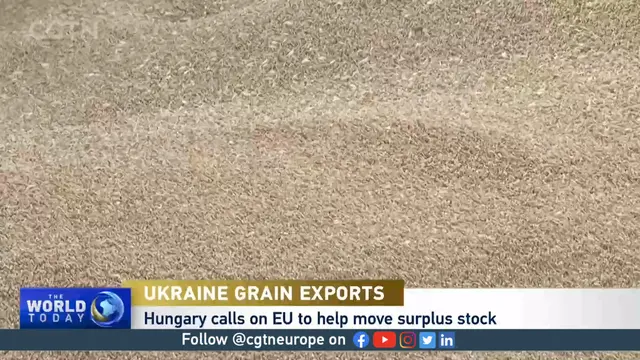Since the European Union lifted import tariffs on agricultural products from Ukraine last summer, more than 23 million tonnes of grains have flooded the bloc. Four countries have temporarily suspended imports after complaints from local farmers that the influx of corn and wheat has disrupted the market and reduced their profits.
Lazar Kis and his family have run a farm outside of Budapest for more than 30 years, but since last summer turning a profit on their products has been much harder.
"It was a very dry year; we lost 30 to 40 percent of our crops," said Kis. "Things then became worse when large amounts of Ukrainian corn and wheat came into the market. Prices dropped 50 percent."
Many farmers throughout Eastern Europe share the same frustration. Since the suspension of import tariffs on Ukraine's goods, the influx of grains and other agricultural products has created what they argue is unfair competition and cut their earnings.
Last year with seaports blocked, Ukrainian grains started moving in trucks and trains to Eastern European countries, but instead of reaching other markets in the EU, most of the products became stranded in countries like Poland or Hungary.
Experts say the shift of routes will have long-term consequences.
"Farmers in the next couple of years need to make the necessary adjustments to this new reality because Ukrainian grain will flow into Europe forever," said George Rasko, an agricultural economist based in Budapest.
Under pressure from local farmers, Poland, Slovakia, Hungary, and Bulgaria temporarily suspended the import of Ukrainian agricultural products.
Poland's government, one of the most outspoken supporters of Ukraine at an EU level since the conflict with Russia started, struck a deal with Kyiv this week to allow sealed convoys of Ukrainian grain to transit through its territory under guard.
Meanwhile, Hungary has called on the EU to intervene and help move Ukrainian imports out of their country.
"Hungary should have banned the imports much earlier," said Tamas Petohazi the President of the Grain Producer's Association of Hungary. "Currently, there are 25 Ukrainian products banned until June 30th, but if the situation remains, we are calling for the ban to be extended."
The European Commission presented a $109 million aid package to the countries affected.
But the funds will only be available if they suspend the unilateral bans. Under the measure, the EU will also stop the import of Ukrainian grains until June 5, and it committed to investigating whether additional measures are required for other Ukrainian agricultural products.
It's welcome news for an agriculture sector battling to survive.
Farmers say the cost of running a farm has soared this past year. They have to pay more for fuel, fertilizers, and labor. Meanwhile, their profits have dwindled. For farmers like Kis, the damage has already been done.
"The EU was quick to allow the import of so much grain, but it was slow with its protections for farmers like us," said Kis.
The best many can hope for now is for things to improve so that they can recover a portion of their losses.
(CGTN)
 简体中文
简体中文

